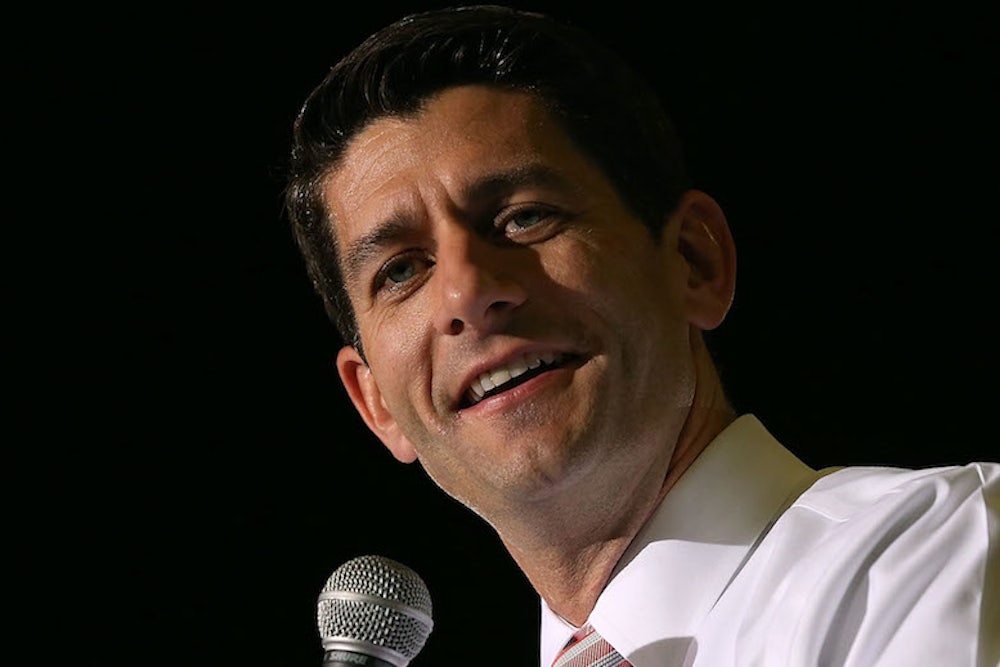Paul Ryan’s reputation in the Washington establishment as a serious thinker has long been out of proportion to reality. Beneath the veneer of a sober-minded deficit hawk – he won a “Fiscy Award” in 2011 – was an ardent Ayn Rand acolyte whose ballyhooed budget plan called for deep cuts in upper-income tax rates and deeper cuts in the safety net. His speech at the 2012 Republican convention was so riddled with mistruths that it sent the factcheckers into overdrive.
But credit where credit is due: on two different fronts so far this year, Ryan has made something of a stand for intellectual honesty and independence of mind, against strong pressures from his own side. The first involves the budget compromise he agreed to with Senator Patty Murray, the Washington Democrat, specifically the provision to reduce cost of living increases for the pensions for retired members of the military while they are still of working age. The move, which is supported by Pentagon brass desperate to get ballooning personnel costs under control, will save $6 billion over 10 years. It will cost the average officer who retires in his early 40s an average of $70,000 or so over the course of his retirement – a total take closer to $1.7 million than $1.8 million, roughly a 3 percent reduction. That’s not an insignificant difference, but it needs to be put in the context of the fact that many retired officers are enjoying long and lucrative careers with military contractors and other private-sector companies upon leaving the military. And, again, the full cost of living increases will kick in once the officers reach 65.
That hasn’t kept the powerful interest groups for retired military officers from loudly protesting the cuts and getting senators on both sides of the aisle to make a show of demanding the cuts be reversed. Just this week, John Boehner let it be known that his party’s next demand for raising the debt limit might well be a reversal of the military pension cut—that is, reversal of a policy that one of his chief lieutenants in the House had agreed to as part of the budget deal. Through it all, though, Ryan hasn’t blinked. “For me, there’s simply no choice between responsible reforms of military compensation and making what our military leadership has called ‘disproportionate cuts to military readiness and modernization,’” he wrote in a USA Today op-ed. “Every time we kick the can down the road, we put our troops’ combat readiness at risk. This agreement put forward one reform option, and I invite others to do the same.”
Then came this week’s Congressional Budget Office report predicting that the Affordable Care Act would reduce hours worked by Americans by the equivalent of about 2 million full-time jobs as more people decide to reduce hours now that securing health insurance is less dependent on their workplace and income. Leaping gleefully on the report, many Republicans blithely distorted its findings to make it sound as if the CBO was predicting that the law would lead employers to lay off 2 million people. “Obamacare to print even more pink slips,” crowed Mitch McConnell.
But not Paul Ryan. It was he who, at a hearing Wednesday, made clear what the report actually said, in an implicit slap at his disingenuous fellow Republicans: “Just to understand, it is not that employers are laying people off,” he said. Granted, Ryan then proceeded to launch his own attack on Obamacare as discouraging work and speeding the way to the “hammock that lulls able-bodied people to lives of dependency and complacency” he has long warned us against. There are plenty of counters to that attack, but no need to get into them here. The bottom line is that there is a debate to be had in the wake of the CBO report about the work ethic and the safety net. And disagree with Ryan as you might, it’s far preferable to be having that debate with someone who’s bringing a modicum of intellectual honesty to the fight. That’s an admittedly low bar, but that’s the point we’ve arrived at these days in Washington.
